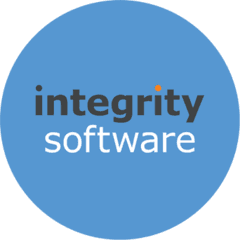Resources
Construction data protection guide
Corporate data breaches pose a significant threat to UK construction firms, so keep your sensitive accounting data safe with our best practice guide.
Corporate data breaches represent one of the single greatest threats to growing businesses and construction firms here in the UK. Not only could a data breach cost you significant time and money to put right, but your firm’s reputation could also be at stake. In the wake of a data breach, many once-loyal contractors and clients frequently become distressingly distant. Your sensitive business data - be it accounts data, contract management information or details referring to your employees and subcontractors - needs to be protected, but how can you ensure that it stays safe at all times? Integrity Software’s best practice guide to data protection will help you keep your data safe from both negligence and malicious attack this year.
Digitise your data
Even some large construction firms still store accounts, payroll and contract management data in a traditional ink-and-paper format. While it can be difficult to break the habit of a lifetime, digitising your business data can help to keep it more secure in future. Physical files can be opened and read by anyone - we’ve all heard those horror stories of sensitive documents being left on the train or the bus – as well as damaged by natural disaster. Digital files can be locked, secured with passwords and even encrypted to keep them safe from prying eyes. If your accounts management software doesn’t offer secure document storage, consider switching to one that does.
Consider password security
While your company’s digital files can be secured with passwords, some are of course more secure than others. You need to select your passwords carefully; easily-guessed phrases and business-specific terms won’t keep people out for long, so be sure to choose something long, complicated and comprised of a sequence of upper and lower case letters and numbers. Think about who has access to these passwords and how frequently they are changed. Recent research has suggested that data breaches have cost 25% of companies between £100,000 and £5m, so using ‘password1’ or your company’s name could have a significant impact.
Invest in security software
Even the best passwords, however, are not enough on their own to keep your data safe from harm. Cybercriminals use malware programs including viruses, worms and spyware to rifle through your digital documents, so you need to take steps to arrest their ingress. Digital security software programs can be used to detect and eliminate malware, preventing cyber-attacks from compromising your data security.
Tell your staff what’s expected of them
While some corporate data breaches come about as the result of a cyber-attack, the majority are actually the consequence of malpractice or ignorance on behalf of your employees. Data security is crucial, but in order to preserve it you need to let your staff know what’s expected of them. Tell them what they can and can’t do with the company’s files and make clear the consequences of negligence. Where possible, limit access to your sensitive data to as few employees as possible - the fewer people that have access to your files, the lower the probability of costly human error.
Hopefully, our best-practice guide to data security will help you to protect your sensitive files from harm this year, but if you’re yet to digitise your data using construction accounts management software, be sure to take a look at the range of solutions available on our website or contact us for more information on how they can help.
About Integrity Software
We have been providing construction software solutions to UK and Irish construction businesses for more than 40 years, and our fully-integrated construction accounting software is used by more than 1,000 leading construction businesses.
© Integrity Software Systems Ltd 2024. Part of the JDM Technology Group
Privacy PolicyCookie PolicyWebsite Terms & ConditionsIntegrity Terms and Conditions
